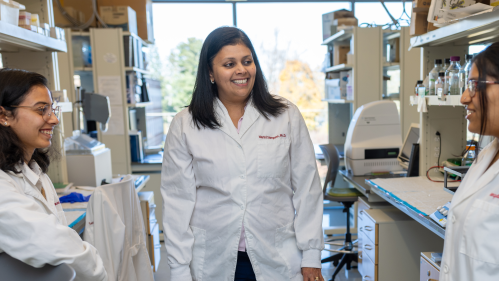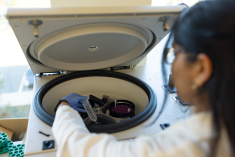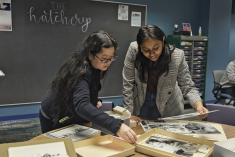
Information for Faculty
Get Involved
Interested in finding great undergraduate researchers and serving as a mentor to some of the brightest students at Rutgers? The Aresty Research Center can help.
The Aresty Research Center serves faculty by advertising research projects, helping to identify strong undergraduate researchers, and guiding students toward structured, professional engagement with research.
Our success with supporting undergraduates depends on the strength of our faculty mentors, so we encourage all Rutgers professors to join us in these efforts. In return, the center connects faculty with outstanding research assistants.
View Projects

Search the Project Database
The Aresty Research Center is the central point of access at Rutgers for professors to share current and upcoming research opportunities and to recruit undergraduate researchers.
Additional Research Support

Whether you’re embarking on a new research project, seeking funding opportunities, or looking to connect with collaborators, the Center for Faculty Success aims to support your scholarly endeavors. Explore the tools, databases, and funding options available to you, and let us help you navigate the rich landscape of research possibilities at Rutgers–New Brunswick.
Programs and Key Dates for Faculty

We invite you to become an undergraduate research mentor through any of our programs:
Research Assistant (RA) Program
For any student who is new to research, the Research Assistant Program pairs them with faculty mentors to conduct a year-long academic project. Students are required to work five hours per week on their research projects and earn 3 credits for the year. No previous research experience is necessary, and there is no minimum GPA. The most important criterion is an interest in and commitment to research. The Aresty Research Center provides research opportunities across all disciplines.
- How to Participate: Faculty project submissions for the 2026-2027 Research Assistant Program are due February 15, 2026. You may create a new opportunity or duplicate one of your previous Aresty projects.
Summer Science Program
For faculty in the sciences, the Summer Science Program pairs rising sophomores with little or no experience to research projects over the summer. Students are required to work full-time in the lab setting and receive structured mentoring from both faculty participants and the Aresty Research Center. Students are provided with a $3,000 stipend in addition to on-campus housing.
- How to Participate: Faculty project submissions for Summer 2026 are due November 14, 2025 at 11:59PM. You may create a new opportunity or duplicate one of your previous Aresty projects.

Funding Opportunities for Undergraduate Researchers
We invite students to submit proposals for funding to help defray the cost of independent research projects, including books, photocopying costs, supplies, travel, and presentations at conferences. Students who are awarded funding through the Aresty Research Center are required to present their research at our symposium in the spring. Awards range depending on both the merit and the quality of the student's application.
- How to Participate: For your advisees, applications to support independent research are due October 15th of each year. Support for student travel to conferences is reviewed on a rolling basis on the first of each month.
Design a Project

Research Project Design Guidelines
Many of our new faculty have questions about designing and managing an effective research project for undergraduates. Other questions include:
- the scope of a typical Aresty research project
- how we help you find students
- what questions to ask during your interviews
- formalizing your relationship with your researcher
- creating a project and structure for your student that will work well.
When you're ready, submitting a project is easy: Our database is open now for you to create a new project or replicate an existing one.
Research Assistant (RA) Program

Are you mentoring a student in the Research Assistant Program? If so, find information on the student selection process and the structure of our programs below.
Application Process: (2025-2026 RA Program)
- Faculty research projects must be submitted to the Aresty Research Center between December 16th and February 24th for the 2025-2026 RA Program.
- Students will begin applying to RA projects in early March. The deadline to apply is April 18th.
- After April 18th, faculty review applicants to their projects and conduct interviews with qualified candidates.
- Faculty should indicate their top choices in the Aresty system. We are often able to support multiple students per project, so let us know if you would like additional students.
- Faculty members should complete their selections by May 5th, at which point the Aresty Research Center will match students to projects. This process is automatic and based on faculty and student preferences. We will detail this process by email to all Aresty mentors.
- Notifications will go out from the Aresty Research Center to selected students in early May.

Structure of the Academic Year
Duration of the program: Students should begin research the first week of class. The program concludes either with the symposium or by arrangement with the professor if more time is needed to complete agreed-upon obligations.
Current 2024-2025 Academic year:
- September 3rd: Aresty RAs expected to begin supporting faculty research (five hours per week).
- September 16th: Peer discussion group meetings begin (five total meetings in the fall).
- September 27th: All RAs submit project plans. Please see the details below.
- November 18th: Faculty mentors submit midyear assessments via Qualtrics.
- March 1st: RAs submit abstracts for the symposium.
- April 12th (tentative): Posters due for printing by the Aresty Research Center.
- April 18th: Faculty mentors submit end-of-year assessments via Qualtrics.
- April 25, 2025: Undergraduate Research Symposium, Alexander Library.
Resources and training for students: The Aresty Research Center is happy to coordinate training for research assistants in our program.
- If your student requires library training, please email us at aresty@echo.rutgers.edu and we will connect your student to a training specialist.
- Students requiring safety training for labs can register for relevant training sessions here.
- For projects requiring IRB approval, students can consult IRB resources and we will facilitate interactions with that office as necessary.

The Project Plan or Contract: By the end of September, all research assistants are required to design a project plan for the year with their faculty mentors and submit it to the Aresty Research Center. The project plan should cover your expectations of the project, key steps in the research process, and the duties of the RA and faculty mentor. RAs need clarity around your goals and expectations for them. This document should make your expectations explicit. You can find a sample project plan for your reference here. Your RA can compile the basics using your original project description but will need your input on goals, checkpoints, and expectations.
Time Commitment: Students are expected to work five hours per week. You may arrange with your RA to do more in exchange for departmental credit. We strongly encourage you to ask your students to track their hours on your project. You can download a sample time sheet to help. A timesheet will both increase accountability and give students a record of activities that can be repurposed for résumés and cover letters.
Peer Discussion Groups: Throughout the academic year, RAs will attend a total of 10 peer group meetings (roughly two per month) at the Aresty Research Center. These meetings support students through their research process by focusing on the role of research in society and professionalism in a research environment. The meetings cover topics like managing relationships, research ethics, and writing abstracts and designing effective posters. You can review an overview of our syllabus and key dates for the year here.
Academic Credit: The Aresty RA program awards students three credits, graded P/NC, for the academic year. The Aresty Research Center enters grades based on feedback from professors and RA completion of program requirements. For students in SOE, credits count toward technical electives. For students in SEBS, credits can be applied to experiential learning requirements. Students in SAS receive general credits. Please note that students eligible for Federal Work-Study may also use the RA program as a Work-Study job.
Mid-Year Assessment: Before winter break, we will review the progress of all RAs. The Aresty Center will ask all mentors to complete a brief web-based evaluation and assess the RA's participation in their peer discussion groups.
Undergraduate Research Symposium: All RAs present their research at the annual Undergraduate Research Symposium in April. The Aresty Research Center requires all students to plan for securing their professors' approval of their research presentations. Students working in groups may either present individually or together.
If you have any questions regarding your involvement in the Research Assistant Program, see our FAQs or contact us.

Additional Information on Peer Discussion Groups
The Aresty Research Center’s peer discussion groups focus on helping students master the social and professional contexts of research. Research is fundamentally a social endeavor: to find mentors, build relationships, and form partnerships, researchers must continuously cultivate their professional and ethical intelligence to become excellent teammates, colleagues, and collaborators. Similarly, while many researchers operate in the relative seclusion of archives and laboratories, discoveries can have no impact on their fields or society more generally until they enter intellectual discourse. Only through effective communication to diverse audiences—via discussions, writing, and presentations—can discoveries be tested, accepted, and incorporated into our collective knowledge.
Learning Goals
Through their peer discussion groups, students should:
- Develop problem-solving skills in research environments.
- Learn to communicate research to diverse audiences.
- Build confidence in the social environment of research.
Peer Discussion Group Policies and Expectations
Group meetings and assignments are a major component of our program, as they connect students with a strong intellectual community and provide structure to their research experiences. Attendance and participation in the peer discussion groups and is mandatory for all research assistants. Repeated lateness or absences will result in dismissal from the Aresty RA program.
Questions, Concerns, and Guidance
Your peer instructor is an experienced undergraduate researcher and a valuable resource for navigating research settings and communication challenges. Director Tamiah Brevard-Rodriguez is available to discuss research-related issues, graduate school, and general advising by appointment. For scheduling conflicts or other programmatic questions, consult with the Aresty Center’s senior program coordinator, Chandni Pathak.
Peer Group Discussion Syllabus
2024-2025 Syllabus
Meeting Group Schedule and Topics - All students must complete the entrance survey by September 27, 2024.
-
Meeting 1: Introduction to Scholarly Communication. Groups will discuss expectations for the RA program, gain familiarity with posters, and develop a plan for the year.
Project plans are due to the Aresty Center by the end of September.
-
Meeting 2: Can vs. Should. RAs will collaborate on case study exercises on the role of research in society and how we value different types of knowledge.
Meeting 3: Team-building. Peer instructors, with input from their groups, should decide upon an accessible meeting activity beyond Aresty’s walls.
-
Meeting 4: Communicating Your Research. Each peer group will watch brief video presentations of research and discuss how to effectively share research with diverse audiences.
Meeting 5: Lightning Presentations. Each RA presents for 120 seconds on his or her research project. The group should provide feedback on each presentation.
-
RA evaluations from professors due November 18, 2024. (Qualtrics link will be sent out.)
No formal meetings. Advising and check-ins on research by appointment.
-
Winter Break: All RAs should discuss research expectations during the break with their faculty mentors. For RAs not doing research during the break, make sure you and your mentor have a plan for restarting research in late January.
-
Meeting 1: Creating Effective Abstracts and Posters. RAs should begin thinking about their poster layout and gain insight into good abstract-writing practices and leave with the confidence to draft an abstract for their research project.
Meeting 2: Abstract Workshop. All RAs should leave this meeting with useful feedback on improving their abstracts and submitting them by the deadline.
-
Final abstracts are due for official submission for the symposium on March 1, 2025.
Meeting 3: Creating Powerful Research Images. What makes an effective presentation of research? This meeting should help RAs design and describe a key image (graph, chart, picture, etc.) that will be central to their poster.
Meeting 4: Peer-editing Posters. To prepare for the symposium, all RAs should bring drafts of their posters to this meeting for peer editing.
-
All posters to be printed through the Aresty Center are due tentatively on April 12th.
April 18th: Spring 2025 faculty RA evaluations due. (Qualtrics link will be sent out.)
Meeting 5: Symposium Dress Rehearsal: In the final meeting, RAs should rehearse their poster presentations. RAs should also have a clear understanding of symposium logistics.
All RAs participate in the 15th Annual Undergraduate Research Symposium on April 25, 2025.
Sample Project Plan
Project Plan: Computational Astrophysics and Dark Matter Fall 2016 – Spring 2017
Research Team
Dr. Charles Keeton, Faculty Member (keeton@physics.rutgers.edu); Student Name, Aresty Research Assistant (student email)
Learning Goals
Broad goals for the Aresty Research Assistant Program:
- Develop problem-solving skills in a research environment
- Learn to communicate research to diverse audiences
- Build confidence in the social environment of research Specific Goals for this Project
- Gain experience with the computational tools used by astrophysicists
- Develop Python software for gravitational lensing
- Use the software to analyze observational data and probe the distribution of dark matter around galaxies
Description of Project
Many lines of evidence indicate that the universe is dominated by two invisible, exotic substances: dark matter forms the scaffolding for the visible universe, while dark energy causes the expansion of the universe to accelerate. Together, dark matter and dark energy account for 95% of the content of the universe. Cosmologists face a conundrum: how can we study substances we cannot see, let alone manipulate? A powerful approach is to observe objects whose motion is influenced by gravity. The principle of using motion to study mass has been applied to planets, stars, galaxies, and even light itself. We see hundreds of cases where the gravity of a distant galaxy acts as a sort of lens, distorting our view of a more distant object. To interpret observations of "gravitational lensing," we use specialized computer software that lets us simulate the light bending and develop models that match the data.
In this project we will work with the computational tools that astrophysicists use to analyze gravitational lensing and investigate dark matter. The goal is not only to produce a valuable software package but also to understand how the software supports the overall quest to understand dark matter.
Student Responsibilities (minimum five hours per week)
A principal aim for this project is to deploy a Python package for gravitational lensing research. A package is based on existing software written by Professor Keeton. Our goals will be to translate some of the core routines from C into Python, develop an effective user interface, and then apply the new Python package to data from astronomical observatories (including the Hubble Space Telescope). The team-based approach will give students plenty of opportunities to suggest and implement their own ideas for the astrophysics software package.
Required Readings and Meeting Schedule
We will meet as a group once a week, plus extra times as needed.
- In Fall 2016, we will meet on Wednesdays from 3:30-4:30 p.m.
- In Spring 2017, we will determine the meeting time based on our schedules.
General Questions
Accordion Content
-
Rutgers undergraduate students have the unique opportunity to observe firsthand how scholars conduct research in a large research university. With you as a mentor, they develop research skills, define academic interests and objectives, and prepare for more advanced research in their future. Undergraduates, while new to the research process, are exposed to invaluable educational opportunities through the process of research, making their undergraduate experience more valuable and making them more capable and employable upon graduating.
Undergraduate research is also beneficial from a departmental perspective: many studies have demonstrated the strong correlation between persistence in a discipline and undergraduate research experiences.
-
Aresty research projects are intended to expose first-time undergraduate researchers to faculty research. When advertising a research project either for our Summer Science or Research Assistant Programs, we keep in mind that students will have enthusiasm and potential, but limited field-specific expertise. Gaining this expertise is the goal of Aresty research projects.
In STEM fields, Aresty students typically become part of faculty labs. In the social sciences and humanities, students help conduct primary research, work on bibliographies, and assist in course and survey design. For examples of previous projects, browse our research opportunity database.
-
Students in the Research Assistant Program receive 3 credits (P/NC) for the year. Grading is administered by the Aresty Research Center with input from faculty mentors. Students who wish to receive departmental credit instead can make arrangements to do so but are still required to meet Aresty program expectations. SAS students receive general credit, SEBS students receive credits that can be applied to experiential learning requirements, and SOE students can apply Aresty RA credits to technical elective requirements.
For students in our Summer Science Program, we provide a $3,000 stipend in addition to housing for the duration of the program. We also provide research awards to advanced undergraduates through our funding program each semester on a competitive basis. Students are invited to apply for funding for a research project that they are undertaking or for presenting their work at a professional conference.
-
Aresty also organizes and coordinates workshops on a variety of topics, including application and interview skills, abstract and poster design, and presentation skills. The center also coordinates a universitywide Undergraduate Research Symposium in the spring.
-
The Aresty Research Center is for Rutgers–New Brunswick undergraduate students and faculty only. Our Research Assistant and Summer Science positions are intended for students with no previous research experience.
-
Yes, our programs are competitive. For our Summer Science Program, the acceptance rate is typically 10-15%. For our Research Assistant Program, the acceptance rate is typically around 30%.
-
While there is no minimum GPA required, students must be in good academic standing and demonstrate a genuine interest in becoming involved in research. No previous research experience is necessary.
Questions from New Faculty
Accordion Content
-
The Aresty Research Center supports projects in all fields, but the structure of projects varies with the field of research. In STEM fields, especially for faculty with research labs, Aresty students assume meaningful roles on lab work, analyze data, attend lab meetings, and conduct literature reviews while learning technical and lab skills. You can read some examples of previous STEM projects and applicant responsibilities in our research project database.
In the social sciences, students often assist in primary research, survey design, and data analysis. In the humanities, many of our research assistants conduct research for course design, conduct archival research, assist in bibliography, and contribute to digitization and multimedia projects. You can browse examples of previous Aresty faculty projects in the humanities and previous projects in the social sciences.
The best projects combine great research opportunities with great mentorship. The Aresty Research Center prioritizes strong mentoring plans, and all students are expected to have regular contact with their faculty mentors.
-
Aresty students are expected to have enthusiasm and potential but limited research experience. The best Aresty mentors balance giving their students challenging research problems against the structure necessary to help students make progress. Ideally, students meet with their mentors weekly or biweekly. Each meeting should set clear goals and expectations of demonstrable research progress. In the humanities and social sciences especially, our mentors report the greatest success when they create discrete assignments for students that move toward a complete project.
-
Aresty creates a highly visible, competitive, and structured application process for students to apply to specific research projects. For both the Summer Science Program and the Research Assistant Program, Aresty advertises research opportunities extensively to undergraduates. In 2017, over 1,200 students applied to roughly 300 faculty research projects.
When our student application process opens, students browse research opportunities in our database by keyword, department, and subject. Projects with clear titles and descriptions attract the most candidates. Students then submit a personal statement, resume, and transcript for projects that interest them. When your project receives applications, you will receive an automated email from the Aresty Research Center.
Once the application period closes, professors have roughly three weeks to interview candidates. Our application system allows you to track interviewees. After conducting your interviews, faculty use our system to indicate their preferred candidate as well as any alternates.
Application and interview process: The application deadline for students to apply to research projects is April 15th. Students can apply to up to three projects. On April 16th, professors should begin to review applications and schedule brief interviews with finalists. On your project page, please indicate who you have interviewed and rank your finalists. At the end of April, the Aresty Research Center will begin matching finalists to projects for next year. Students will have one week to confirm their acceptance.
Student eligibility for the RA program: The RA program is intended to help students gain access to their first authentic research experiences. Any student without significant research experience in the field of the Aresty project is eligible. We strongly encourage professors to consider the whole applicant, not just GPA, and are especially supportive of faculty who engage with students from traditionally underrepresented groups in their research. Students with previous experience, or who are already in a research environment, are best served through our research fellowship program.
-
The students you interview will have no shortage of academic merit. However, many will have very limited professional experience. Veteran Aresty faculty say they focus on ensuring that candidates possess the professional behaviors necessary to succeed on a research project: a sense of ownership over results, an understanding of professional courtesy (i.e., calling if they are going to be late), and a plan to balance their other obligations to stay focused on their research.
Ask your candidates questions that will provide insight into the behaviors that will make them successful on your project. A few questions to ask could be:
- What would you do if you realized there was an error in data or information you had been collecting?
- Tell me about a time when you missed an obligation and how you handled it.
- Tell me about a time you had to navigate competing deadlines.
- What other obligations do you have next year, inside and outside the classroom?
-
Once you have indicated your preferred candidate in our system, the Aresty Research Center matches students to research projects based on both student and faculty preference. Please note that our "matching date" is firm: professors who have not indicated their top choices by then will have to choose from the remaining students after matches are processed. The matching date for your program will be listed in the confirmation email you receive when your project is accepted.
On the matching date, students receive an email informing them of their research project. Faculty should then reach out to students to set expectations for when research will begin and create a contract to formalize expectations.
Research Assistant Program
Accordion Content
-
Rutgers–New Brunswick faculty may submit a research opportunity for the Research Assistant Program. View more information about how to submit your opportunity here. The program runs from September to May each year.
-
Rutgers–New Brunswick students may apply for a maximum of three projects and must submit a separate application for each. If a student is chosen for more than one project, then the student may choose their preferred project. The typical project will receive eight to 12 applicants. When the application process begins, you will receive email notifications when students have applied for your research project. By logging into your project, you can review applications, select students to interview, and indicate your top choice. The Aresty Research Center will then match a student to your project.
-
No, students may only participate in the Aresty Research Assistant Program once. Students continuing independent research or working on senior theses can apply to the research funding program.
-
Yes, rising seniors are eligible to apply for our RA program during their junior year, but it is useful to probe potential RAs on their commitments and plans for senior year, since graduate school interviews, senior thesis work, and transition to post-Rutgers life can all slow research progress.
-
Yes. In the Undergraduate Research System, when you click "Create a Project," you will have the option to duplicate a project.
Summer Science Program
Accordion Content
-
Rutgers–New Brunswick faculty may submit a research opportunity for the Summer Science Program. View more information about how to submit your opportunity here. The program runs roughly nine weeks between the end of May and early August each year.
-
Rutgers–New Brunswick students may apply for a maximum of three projects and must submit a separate application for each. If a student is chosen for more than one project, then the student may choose their preferred project.
-
The Aresty Research Center will be able to support one student per project for the Summer Science Program. When the application process begins, you will receive email notifications when students have applied for your research project. By logging into your project, you can review applications, select students to interview, and indicate your top choice. The Aresty Research Center will then match a student to your project.
-
Faculty members are provided with one full-time research assistant in their lab. Students are provided with a $3,000 stipend and housing for the 10-week program. Learn more about the program here.
-
Yes. When you create your project in the Undergraduate Research System, you may categorize it for both programs.
-
Yes. In the Undergraduate Research System, when you click "Create a Project," you will have the option to duplicate a project.
Funding
Accordion Content
-
As part of the student's application, the faculty mentor must review and approve the student's project overview and detailed budget and provide a letter of endorsement to the Aresty Research Center. This is all done online and you will be notified once your student submits an application.
-
We invite students to submit proposals for funding to help alleviate the cost of research, including books, photocopying, supplies, travel, and presentations at conferences. Funding cannot be used for meals, living expenses, tuition, or equipment that will be used beyond the duration of the research project. In general, the Aresty Research Center does not fully fund student research projects, rather we encourage students to seek funding from multiple sources. The average amount requested is $1,000 and the average amount awarded is $500. We also have funding available for students accepted to present at conferences. Learn more about our funding opportunities here.
-
All applications are reviewed by the Aresty Faculty Review Board. Project proposals are evaluated on their merit and adherence to the application guidelines. We invite faculty across disciplines to join our review board. Contact us to learn more.
-
Yes. Students who receive checks may sign them directly over to your department. Please arrange this with your business office.
-
All funding recipients must submit receipts for all award money spent no later than the end of the spring semester, or at the end of the project, whichever comes first. The money spent must align with the budget that was submitted with the application. Any funds not spent from the award must be returned. Additionally, all funding recipients are required to participate in a series of workshops and present their research at the annual Undergraduate Research Symposium.
Undergraduate Research Symposium
Accordion Content
-
Only participants in the Aresty Research Assistant Program, as well as recipients of funding through the grant program, are required and eligible to present their work due to limited capacity.
-
We offer workshops on various topics, including selecting a research project, finding a faculty mentor, writing an abstract, how to develop an effective poster for presenting your research and many other topics related to undergraduate research. These workshops are open to all Rutgers–New Brunswick undergraduate students. View our upcoming events here.
If you have more questions, or would like to discuss an idea, feel free to contact the staff at the Aresty Research Center.
